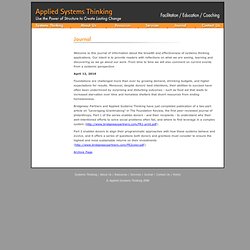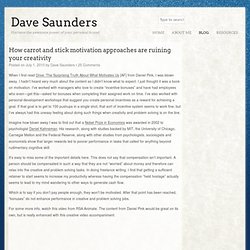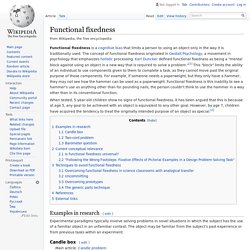

Applied Systems Thinking / Journal. Welcome to this journal of information about the breadth and effectiveness of systems thinking applications.

Our intent is to provide readers with reflections on what we are seeing, learning and discovering as we go about our work. From time to time we will also comment on current events from a systemic perspective. April 12, 2010 Foundations are challenged more than ever by growing demand, shrinking budgets, and higher expectations for results. Moreover, despite donors' best intentions, their abilities to succeed have often been undermined by surprising and disturbing outcomes - such as food aid that leads to increased starvation over time and homeless shelters that divert resources from ending homelessness.
Bridgeway Partners and Applied Systems Thinking have just completed publication of a two-part article on "Leveraging Grantmaking" in The Foundation Review, the first peer-reviewed journal of philanthropy. Archive Page. CORDIS : Search : Simple search : Documents : results. Journal of Risk and Uncertainty, Volume 19, Numbers 1-3. Dan Ariely. IEEE Systems Journal. Applied Systems Thinking Institute - Journals/Books. Www.asysti.org/OurModules/SharedDocs/DocumentView.aspx?ID=109. Steven Johnson: Where good ideas come from. Dan Pink on the surprising science of motivation.
How carrot and stick motivation approaches are ruining your creativity — Dave Saunders. When I first read Drive: The Surprising Truth About What Motivates Us [AF] from Daniel Pink, I was blown away.

I hadn’t heard very much about the content so I didn’t know what to expect. I just thought it was a book on motivation. I’ve worked with managers who love to create “incentive bonuses” and have had employees who even—get this—asked for bonuses when completing their assigned work on time. I’ve also worked with personal development workshops that suggest you create personal incentives as a reward for achieving a goal. Imagine how blown away I was to find out that a Nobel Prize in Economics was awarded in 2002 to psychologist Daniel Kahneman.
It’s easy to miss some of the important details here. Which is to say if you don’t pay people enough, they won’t be motivated. For some more info, watch this video from RSA Animate. This video from TED is also worth watching. “This is one of the most robust findings in social science, and it’s also one of the most ignored.” What do you think? Functional fixedness. Functional fixedness is a cognitive bias that limits a person to using an object only in the way it is traditionally used.

The concept of functional fixedness originated in Gestalt Psychology, a movement in psychology that emphasizes holistic processing. Karl Duncker defined functional fixedness as being a "mental block against using an object in a new way that is required to solve a problem. "[1] This "block" limits the ability of an individual to use components given to them to complete a task, as they cannot move past the original purpose of those components. For example, if someone needs a paperweight, but they only have a hammer, they may not see how the hammer can be used as a paperweight. When tested, 5-year-old children show no signs of functional fixedness. Examples in research[edit] Experimental paradigms typically involve solving problems in novel situations in which the subject has the use of a familiar object in an unfamiliar context. Candle box[edit] Two-cord problem[edit]